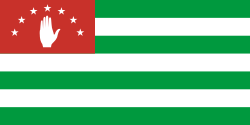Top Qs
Timeline
Chat
Perspective
Economy of Abkhazia
Economy of the Republic of Abkhazia From Wikipedia, the free encyclopedia
Remove ads
The economy of Abkhazia is heavily integrated with the economy of Russia and uses the Russian ruble as its currency. Since the 2008 South Ossetia war and Russia's recognition of Abkhazia's independence, the region has experienced modest economic growth largely supported by Russian financial aid. As of 2021, 43.6% of Abkhazia’s state budget was funded by aid from Russia, while the remainder came from local revenues.[1][2]
This article needs to be updated. (July 2025) |
Some analysts describe Abkhazia’s economic model as a form of oligarchic capitalism.[3]
Remove ads
Tourism
Tourism remains a key sector, with nearly one million tourists—mostly from Russia—visiting in 2007.[4] Russian citizens enjoy visa-free travel under a bilateral agreement, while citizens of other countries require an Entry Permit Letter issued by Abkhaz authorities.[5]
Transport
The Abkhazian railway operates under a management agreement with Russian Railways. In 2016, over 300,000 passengers traveled between Abkhazia and Russia by rail.[6] Sukhumi Babushara Airport is the region’s main airport.
Agriculture
Agriculture remains significant, with tea, tobacco, wine, and citrus fruits (notably tangerines) as key products.
Electricity generation
Abkhazia relies on the Inguri Dam hydroelectric station, co-managed with Georgia. Since 2024, the region has faced severe power shortages after Russia discontinued subsidized electricity in response to political tensions.[7] Cryptocurrency mining operations reportedly consume up to 50% of the grid’s capacity, exacerbating the crisis.[8]
Trade
Abkhazia’s trade is dominated by Russia (64%), followed by Turkey (18%) and smaller shares from the EU and China.[9]
Foreign investment
Russian municipalities and private investors are active in Abkhazia. The 2014 Sochi Olympics spurred investment in local infrastructure.[10] The European Union has also contributed more than €20 million since 1997 for humanitarian and infrastructure projects.[11]
Challenges
Widespread corruption, organized crime influence, and overreliance on Russian aid have hindered economic diversification.[12]
References
Wikiwand - on
Seamless Wikipedia browsing. On steroids.
Remove ads

